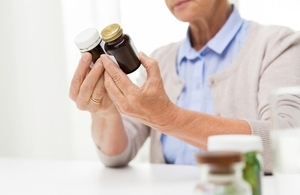MHRA is working with industry to make the packaging of medicines used in Alzheimer’s disease more user-friendly
The Medicines and Healthcare products Regulatory Agency (MHRA) is working with the pharmaceutical industry to optimise the presentation of medicines for Alzheimer's disease.

Lady looking at medicine
The Medicines and Healthcare products Regulatory Agency (MHRA) is working with the pharmaceutical industry to optimise the way medicines for the treatment of Alzheimer’s disease are presented.
All these medicines will include the days of the week clearly on the blister packs. This small but important change may enable patients to retain independence in taking their medicines. It could have the added effect of aiding compliance with dosage regimens and ultimately maximising the efficacy of treatment for patients.
We expect that the improved packaging will be introduced from June 2016.
George McNamara, Head of Policy at Alzheimer’s Society, said:
It’s great that the voices of people with dementia have been heard and much-needed action is being taken. Medication packaging can be confusing for people with dementia. Simple modifications, such as indicating the days of the week or making the font clearer to read, can have huge implications for both the independence and the safety of people living with dementia.
While it’s encouraging to see this change being implemented for dementia medication, nearly 3 quarters of people with dementia are also living with other long-term illnesses. We would like to see other companies within the pharmaceutical industry following suit to create dementia-friendly medication packaging across the board.
Life Sciences Minister, George Freeman MP said:
Dementia is a devastating condition, which is why we are committed to ensuring that the UK becomes a world-leader in care, support and research by 2020 - thanks to the Prime Minister’s challenge on dementia.
Medicines packaging which clearly indicates when to take each tablet will help to give greater independence to those living with dementia, and improve confidence, safety, and outcomes.
Dr Sarah Branch, Deputy Director of MHRA’s Vigilance and Risk Management of Medicines (VRMM) Division said:
The MHRA has listened to the concerns of patients and will tailor the way in which the medicines we authorise are presented to the market to better meet their needs.
Background
- The Medicines and Healthcare products Regulatory Agency (MHRA) is responsible for regulating all medicines and medical devices in the UK by ensuring they work and are acceptably safe. All our work is underpinned by robust and fact-based judgements to ensure that the benefits justify any risks. MHRA is a centre of the Medicines and Healthcare products Regulatory Agency which also includes NIBSC and CPRD. The Medicines and Healthcare products Regulatory Agency is an executive agency of the Department of Health.
- The medicines affected are galantamine, rivastigmine, donepezil and memantine.
Media enquiries
News centre
MHRA10 South Colonnade
London
E14 4PU
Email newscentre@mhra.gov.uk
Telephone (including out of hours): 020 3080 7651